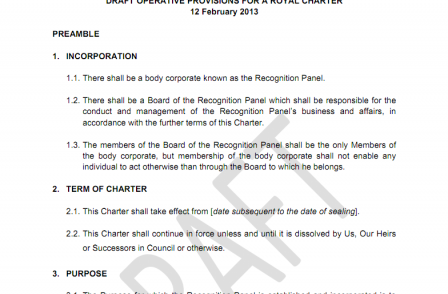The majority of the newspaper industry has rejected the Government proposed Royal Charter on the regulation of the press and put forward its own plan.
The move comes just days before the Royal Charter plan agreed by the three main political parties last month was due to go for approval at the next meeting of the Privy Council on 15 May.
Mail on Sunday editor emeritus Peter Wright told Radio 4 that the Financial Times, Independent and Guardian are all in talks about signing up to the new plan.
A statement put out by the Newspaper Society said: "The draft Royal Charter published by the Government on 18 March – which has been condemned by a range of international press freedom organisations, including in the Commonwealth – has no support within the press. A number of its recommendations are unworkable and it gives politicians an unacceptable degree of interference in the regulation of the press.
"This initiative by the UK’s national, regional and magazine publishers completely accepts the need for a new regulator to be recognised by a genuinely independent body – which was a central conclusion of the Leveson Inquiry – and aims to help move the debate about the future regulation of the press to a constructive conclusion. Importantly, there will be a public consultation on the industry’s proposals giving newspaper and magazine readers the chance to have their say – a consultation that the Government has refused for its state-sponsored scheme.
"The industry’s proposal is closely based on the draft Royal Charter published on 12 February which had been painstakingly negotiated with national and local newspapers and magazines, and accepted by Ministers. It is a workable, practical way swiftly to deliver the Leveson recommendations, which the industry accepts, without any form of state-sponsored regulation that would endanger freedom of speech. It has widespread backing across the industry. It will deliver a system of regulation which will provide real protection for the public and which offers:"
The new plan states that the regulator will the power to levy fines of up to £1m and carry out investigations.
The statement states that the new regulator will have "genuine independence from the industry and from politicians with all the bodies making up the new regulator having a majority of independent members appointed openly and transparently".
However under the plan, the industry will have its own direct representative on the recognition panel which will licence the new press regulator. The industry also proposes that the Charter should have the ability to be amended in future with the unanimous agreement of the recognition panel, the board of the regulator and the newspaper industry trade bodies. This appears to run counter to the cross-party deal which proposes that the Royal Charter should be set in stone via legislation requiring a two-third majority in both houses of Parliament for it to be changed.
The statement says: "This Royal Charter proposal will deliver on Leveson and bind the UK’s national and local newspapers and magazines to a tough and enduring system of regulation – tougher than anywhere else in the western world – which will be of real benefit to the public, at the same time as protecting freedom of speech."
Email pged@pressgazette.co.uk to point out mistakes, provide story tips or send in a letter for publication on our "Letters Page" blog


